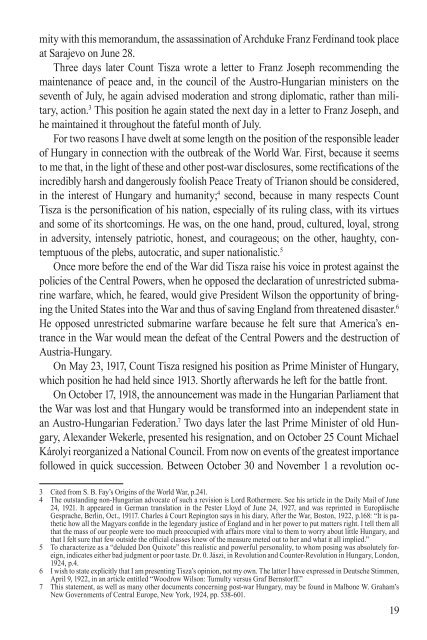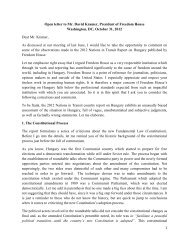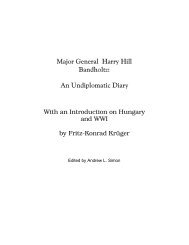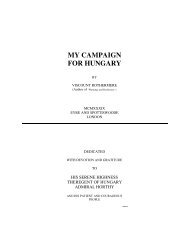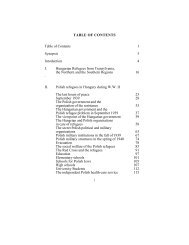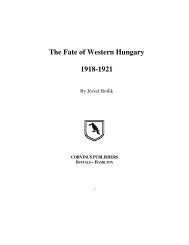Hungary and the Hungarians - Corvinus Library - Hungarian History
Hungary and the Hungarians - Corvinus Library - Hungarian History
Hungary and the Hungarians - Corvinus Library - Hungarian History
You also want an ePaper? Increase the reach of your titles
YUMPU automatically turns print PDFs into web optimized ePapers that Google loves.
mity with this memor<strong>and</strong>um, <strong>the</strong> assassination of Archduke franz ferdin<strong>and</strong> took place<br />
at Sarajevo on June 28.<br />
Three days later Count Tisza wrote a letter to franz Joseph recommending <strong>the</strong><br />
maintenance of peace <strong>and</strong>, in <strong>the</strong> council of <strong>the</strong> Austro-<strong>Hungarian</strong> ministers on <strong>the</strong><br />
seventh of July, he again advised moderation <strong>and</strong> strong diplomatic, ra<strong>the</strong>r than military,<br />
action. 3 This position he again stated <strong>the</strong> next day in a letter to franz Joseph, <strong>and</strong><br />
he maintained it throughout <strong>the</strong> fateful month of July.<br />
for two reasons I have dwelt at some length on <strong>the</strong> position of <strong>the</strong> responsible leader<br />
of <strong>Hungary</strong> in connection with <strong>the</strong> outbreak of <strong>the</strong> World War. first, because it seems<br />
to me that, in <strong>the</strong> light of <strong>the</strong>se <strong>and</strong> o<strong>the</strong>r post-war disclosures, some rectifications of <strong>the</strong><br />
incredibly harsh <strong>and</strong> dangerously foolish Peace Treaty of Trianon should be considered,<br />
in <strong>the</strong> interest of <strong>Hungary</strong> <strong>and</strong> humanity; 4 second, because in many respects Count<br />
Tisza is <strong>the</strong> personification of his nation, especially of its ruling class, with its virtues<br />
<strong>and</strong> some of its shortcomings. He was, on <strong>the</strong> one h<strong>and</strong>, proud, cultured, loyal, strong<br />
in adversity, intensely patriotic, honest, <strong>and</strong> courageous; on <strong>the</strong> o<strong>the</strong>r, haughty, contemptuous<br />
of <strong>the</strong> plebs, autocratic, <strong>and</strong> super nationalistic. 5<br />
Once more before <strong>the</strong> end of <strong>the</strong> War did Tisza raise his voice in protest against <strong>the</strong><br />
policies of <strong>the</strong> Central Powers, when he opposed <strong>the</strong> declaration of unrestricted submarine<br />
warfare, which, he feared, would give President Wilson <strong>the</strong> opportunity of bringing<br />
<strong>the</strong> United States into <strong>the</strong> War <strong>and</strong> thus of saving Engl<strong>and</strong> from threatened disaster. 6<br />
He opposed unrestricted submarine warfare because he felt sure that America’s entrance<br />
in <strong>the</strong> War would mean <strong>the</strong> defeat of <strong>the</strong> Central Powers <strong>and</strong> <strong>the</strong> destruction of<br />
Austria-<strong>Hungary</strong>.<br />
On May 23, 1917, Count Tisza resigned his position as Prime Minister of <strong>Hungary</strong>,<br />
which position he had held since 1913. Shortly afterwards he left for <strong>the</strong> battle front.<br />
On October 17, 1918, <strong>the</strong> announcement was made in <strong>the</strong> <strong>Hungarian</strong> Parliament that<br />
<strong>the</strong> War was lost <strong>and</strong> that <strong>Hungary</strong> would be transformed into an independent state in<br />
an Austro-<strong>Hungarian</strong> federation. 7 Two days later <strong>the</strong> last Prime Minister of old <strong>Hungary</strong>,<br />
Alex<strong>and</strong>er Wekerle, presented his resignation, <strong>and</strong> on October 25 Count Michael<br />
károlyi reorganized a National Council. from now on events of <strong>the</strong> greatest importance<br />
followed in quick succession. Between October 30 <strong>and</strong> November 1 a revolution oc-<br />
3 Cited from S. B. fay’s Origins of <strong>the</strong> World War, p.241.<br />
4 The outst<strong>and</strong>ing non-<strong>Hungarian</strong> advocate of such a revision is Lord Ro<strong>the</strong>rmere. See his article in <strong>the</strong> daily Mail of June<br />
24, 1921. It appeared in German translation in <strong>the</strong> Pester Lloyd of June 24, 1927, <strong>and</strong> was reprinted in Europäische<br />
gesprache, Berlin, Oct., 19117. Charles à Court Repington says in his diary, After <strong>the</strong> War, Boston, 1922, p.168: “It is pa<strong>the</strong>tic<br />
how all <strong>the</strong> Magyars confide in <strong>the</strong> legendary justice of Engl<strong>and</strong> <strong>and</strong> in her power to put matters right. I tell <strong>the</strong>m all<br />
that <strong>the</strong> mass of our people were too much preoccupied with affairs more vital to <strong>the</strong>m to worry about little <strong>Hungary</strong>, <strong>and</strong><br />
that I felt sure that few outside <strong>the</strong> official classes knew of <strong>the</strong> measure meted out to her <strong>and</strong> what it all implied.”<br />
5 To characterize as a “deluded don Quixote” this realistic <strong>and</strong> powerful personality, to whom posing was absolutely foreign,<br />
indicates ei<strong>the</strong>r bad judgment or poor taste. dr. 0. Jászi, in Revolution <strong>and</strong> Counter-Revolution in <strong>Hungary</strong>, London,<br />
1924, p.4.<br />
6 I wish to state explicitly that I am presenting Tisza’s opinion, not my own. The latter I have expressed in deutsche Stimmen,<br />
April 9, 1922, in an article entitled “Woodrow Wilson: Tumulty versus graf Bernstorff.”<br />
7 This statement, as well as many o<strong>the</strong>r documents concerning post-war <strong>Hungary</strong>, may be found in Malbone W. graham’s<br />
New governments of Central Europe, New york, 1924, pp. 538-601.<br />
19


